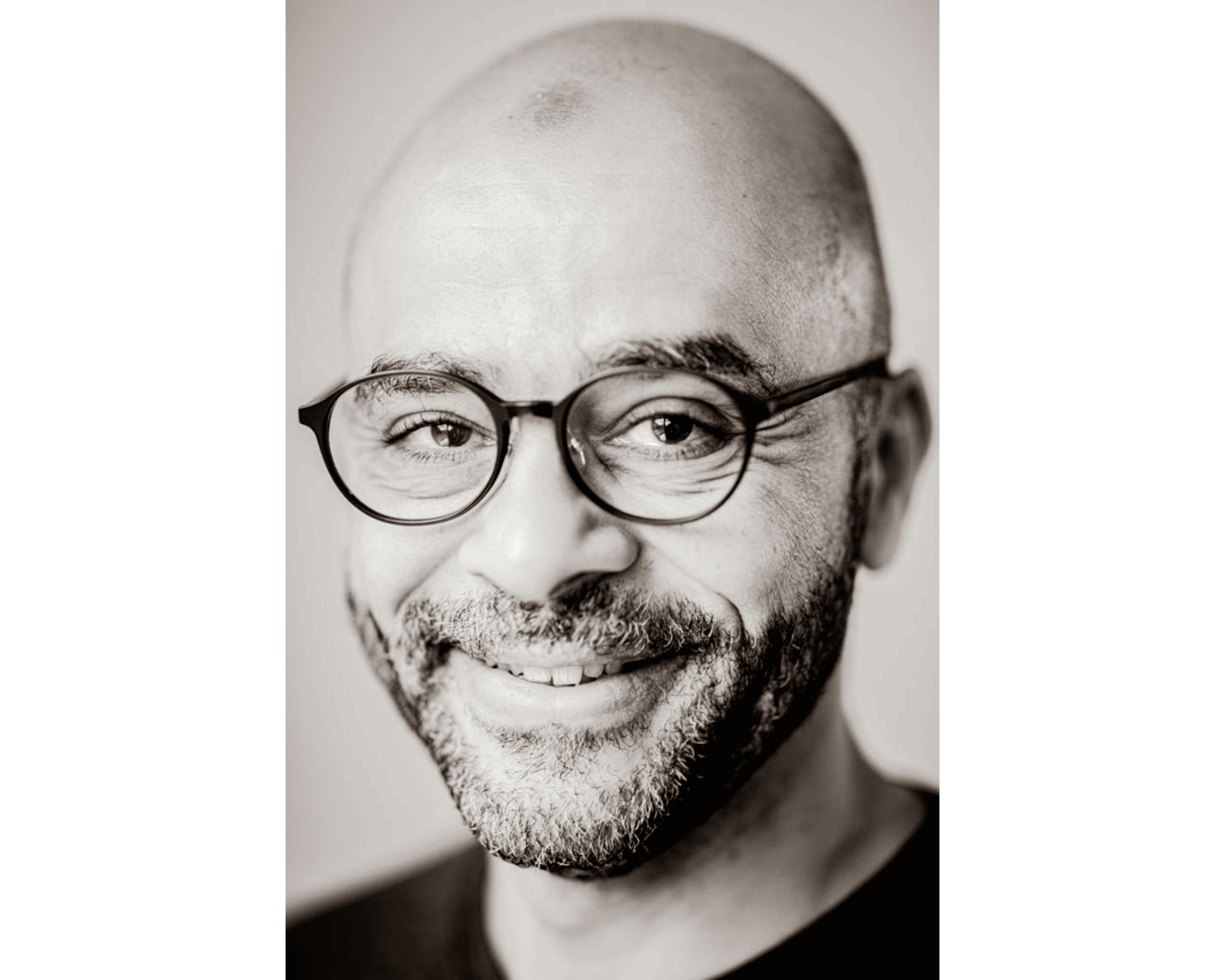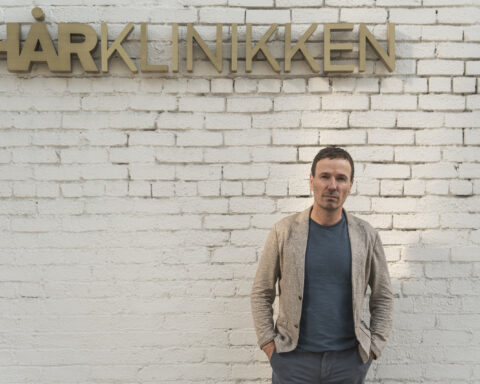As chief business officer at Google X, the technology giant’s top-secret “moonshot factory”, Mo Gawdat led a team of the world’s most dynamic inventors and engineers, attempting to find radical solutions to the world’s most fundamental problems.
Autonomous robots, driverless cars and space elevators were all among the topics found on their morning agenda, as they attempted to make the stuff of science fiction a reality to improve our lives.
But throughout his time at the cutting edge of technology, Mo was also working on a personal mission to solve what is perhaps the most fundamental challenge of all: how to be happier. It’s an assignment he has now dedicated himself to for 20 years, applying his analytical computer engineer’s brain to find the formula of happiness. And he believes he has cracked the code, so is now dedicating his life to sharing his findings with the world.
Mo’s search for more joy began aged 29, when he was making so much money as a self-taught day trader that he once bought two Rolls-Royces online in one night.
“I had nothing in Egypt growing up,” he says. “And when I left home and had to run the finances myself, it was not unusual that the last week of every month, we had nothing to eat.
“I went from that to printing money, a Jaguar and a 4×4 parked outside next to the swimming pool. I had a beautiful woman for a wife, who was my college sweetheart, and two incredible kids. I had everything that anyone could ever dream of. And I was miserable. I was literally depressed.”
So just as Mo had developed an algorithm to be victorious in the financial markets, he started working on decoding why he was unhappy, and finding a method to restore the joy he had felt in the first 25 years of his life.
“I’m a bookworm, so I read everything I could lay my hands on,” he explains. “And I couldn’t understand a word of it, because the language was either too mystical or too practice-driven. I was an engineer, a mathematician and a business executive, I don’t want anyone to tell me ‘Say Om.’ First, tell me why ‘Om’ works.”

Mo and his son Ali
Mo’s breakthrough came when he realized he already had the perfect partner and mentor for his happiness mission, his son Ali, who he calls “instinctively peaceful and calm.” While Mo brought his scientific brain to the project, Ali brought the heart. They started collaborating to find the formula for happiness together when Ali was just eight years old, and by the time he turned 16, they felt like they’d figured it out. Mo had pulled himself out of his depression using research and logic, and had created an actionable process – that they called their “happiness flow chart” – to improve and protect his happiness.
But then, as Mo was enjoying some of the happiest years of his life with wife Nibal, Ali and daughter Aya, tragedy struck in 2014 when Ali died, aged 21, during a routine appendectomy in Dubai, subjecting their work together to the ultimate test.
“Ali has always of course been my wonderful son, but he was also my best friend and my mentor,” Mo, now 53, says. “It was a simple surgical mistake, actually, five mistakes in a row. All of them preventable, all of them fixable. The surgeon did all five, and four hours later we lost Ali.
“When you’re put in that situation, the typical reaction is vengeance and a lot of grief. And because I was the chief business officer of Google X, I knew government officials at the very top level. So one of the senior members of the government called me and said, ‘Is it okay if we perform an autopsy on his body? We need to get to the bottom of this.’ So I asked his mother, ‘Is it okay?’, and she looked at me with a little tear in her eye, and said, ‘Will it bring him back?’
“I think that truth, of realizing that nothing you could ever do could bring him back, was when everything shifted. That’s when my decision became clear that instead of wasting my energy on the negative, I should share what he taught me and try to make something beautiful out of it.”
From that day forward, seeking and sharing happiness became Mo’s number one priority. Shortly after Ali’s death he started writing the book, ‘Solve For Happy’, which was released in 2017, and in 2018 he left Google X after 12 years at the company to focus on his ‘One Billion Happy’ project, a mission to make a billion people happier around the world. (It actually began as ‘10 Million Happy’, but then after achieving that goal in eight weeks, Mo raised the stakes.) And when lockdown threatened to slow down his ability to share his message last year, he launched his podcast, ‘Slo Mo’, to continue to reach the widest possible audience and honor his son’s legacy.
Mo has now spent two decades engaged in a series of long and dedicated personal experiments to test, improve and protect his own happiness, including recording detailed data of when he was happy and unhappy and why over a period of several years. Here he shares with the Mr Feelgood community five of his key findings of how to live a happier life:

‘Solve For Happy’ artwork
MANAGE EXPECTATIONS
Among Mo’s key findings is the important role expectations play in defining our happiness. And the ‘Happiness Equation’ he landed on is this: “Happiness is equal to or greater than the difference between the events of your life and your expectations of how life should be.”
Mo explains, “Life will throw events at you, and you’ll compare those events to how you want your life to be. If life meets your expectations, or beats it, you’re happy, if it misses your expectations you’re unhappy.
“Here’s an example, if you were born in India, and grew up in a family where you didn’t expect to eat every day, and your mom gave you a bowl of rice, you’d feel very happy. Then the other extreme is you are locked down for the pandemic, and order something from Uber Eats with two clicks on your phone. It arrives on your doorstep and is good food, but you complain because you’re supposed to be at the bar with your friends. The food is better, but your expectations are different.
“So expectations make a difference — and managing expectations does work. Having said that, I am a modern day warrior like all of us. I have my startup, my podcast, my writing. I’m working hard in life and I want to make an impact. But I differentiate between my ambition and my expectations. You should set an expectation that is realistic and then shatter it.
“‘One Billion Happy’ is an ambition, not an expectation. My expectation is I will do the best I can. If I meet one person at a cafe and manage to make them happy, my ‘One Billion Happy’ goal happened today.”
BE, LEARN, DO
Mo encourages us all to examine what makes us happy and unhappy, learn from it, and change our behavior accordingly. He calls the process “be, learn, do” and the technique has been at the center of his personal improvement and maintenance of his own happiness.
He says, “Being is a state of awareness of what you’re feeling, what makes you happy or unhappy. Then if you can acknowledge that, you can learn what you need to do. And then you do it.
“For example, firstly you recognize that when I’m in nature, I’m always happy. That is a state of awareness. Then you learn. Why does nature make me happy? It’s because nobody ever objects to nature because the events are always meeting the expectations. Nobody ever looks at a crooked tree and says, ‘No, hold on. This tree needs to be vertical.’
“And now you have the awareness and have learned from it, you can say, ‘Oh my god, yeah. I accept everything in nature exactly as it is, how can I apply that to the rest of my life?’”
SCHEDULE YOUR HAPPINESS (AND UNHAPPINESS)
Mo recommends scheduling an hour, four or five times a week, to do things that make you happy.
“Happiness is literally like fitness,” he says. “Our muscles respond to exercise and our brains respond to neuroplasticity. If you can start to cultivate happiness habits, you will become happier over time. It’s attainable and predictable. If you work at it, you will get there.
“Make it your priority and go to the happiness gym. That could include reading a book, listening to a podcast, spending time with people who make you happy.”
And he recommends that we should limit our exposure to things that make us unhappy, which may sound obvious, but so many of us keep doing the same things over and over again, despite them bringing us anxiety or stress.
“Neuroplasticity works both ways,” Mo explains. “Avoid the stuff that makes you unhappy, especially if you have no impact on it whatsoever.
“I had a guest on my podcast who said about the news, ‘I schedule my anxiety. I need to know the truth but I only need to know in ten minutes a day – so I watch the news between 2pm and 2.10pm. I don’t stress myself over the negative all the time.’
“And I have not watched a horror movie for 14 years. You have to cleanse yourself from things that make you unhappy.”
FIGURE OUT WHAT YOU’RE NOT
“The true path to happiness is complete self-awareness and self-acceptance,” says Mo. And he suggests the easiest way to figure out who we are, is to figure out who we are not.
Mo engages in a practice, which he calls “the opposite of meditation”, where he sits in silence for 10 to 15 minutes, and writes down all the thoughts that come into his head. Then afterwards he reads through the thoughts to decipher what are his true beliefs, and what are the result of his conditioning.
“You start to see contradictions and get to an awareness where you understand some of it is conditioning and some of it is real,” he says.
“Most of my research on happiness and awareness is a process of negation. You are never going to be able to ask yourself, ‘What is my true essence?’ But you can say, ‘What is not my true essence?’”
He adds, “I’m actually very spiritual, and I would consider myself religious. But I’m not just a Muslim, I’m not just a Sufi, I’m not just Christian. I’m all of them. There are so many gold nuggets in each of them, and so much bulls***. So can we please remove the bulls*** and keep the gold nuggets?
“Now, to get from being raised in a conservative Muslim society, to that point, requires a massive level of awareness. To say, ‘Hold on, this is not your fault, Mo. This is the fault of your teacher, this is the fault of your mother, that is the fault of the guy that you heard in the mosque.’”
TAKE CONTROL
Mo’s podcast ‘Slo Mo’ is now just over a year old, and is reaching thousands of people every day. His guests have included celebrities, billionaire businessmen and many inspirational folk who have overcome adversity in their lives.
He says, “I think many of the learnings from my podcast revolve around one thing – taking charge. Whether it’s Edith Eger, who was taken to Auschwitz when she was 16 and managed to get through that horrific experience and come out of it as an angel, teaching people amazing things. Or Sophie Elwes, who fell from a balcony at a party and is paralyzed from the chest down, an inspiring young lady who is playing sports for national teams and doing amazing things.
“You start to ask yourself, ‘What is it that I’m not taking charge of?’ And that to me is really eye-opening.”

Mo’s son Ali shortly before his death in 2014
Despite his work taking a more analytical approach to happiness than most self-help texts, Mo is still keen for his book and ‘One Billion Happy’ project to reach more men.
“Self-help is sometimes a little wishy-washy,” he says. “And theoretically, ‘Solve For Happy’ should be a very good fit and appropriate for the analytical brain. In reality, however, I think 82% of my readers are women.
“I believe men have been conditioned to work as gears in a machine, and to actually not acknowledge the state of unhappiness and stress that they go through. And so even though the logic in the book is fit for the masculine brain, I believe that the masculine brain does not usually get to that book because they don’t acknowledge that they are unhappy.”
Since recognizing that unhappiness in himself two decades ago, Mo’s dedication to his well-being has helped him through one of the biggest challenges anyone can face, losing a child. Now he finds purpose, comfort (and happiness, of course) in sharing his findings with others, and takes hope from how many others are also beginning to “acknowledge something is off” and seeking to improve their lives.
He says, “I want to deliver a message to people that happiness is your birthright. And if you’re happier, you’re more productive, you’re nicer to your children, you’re better with your clients.
“It’s like your health. When you get a sore throat, you take action to get back to a state of health, because it’s the optimum form of performance for you. Similarly, with happiness, it’s the ultimate form of performance and survival.”











